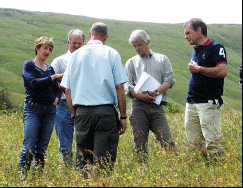The Countryside Farmer of the Year finalists – Robert and Sarah Helliwell

Upper Booth, Edale, Derbyshire
If you thought that tough upland farming doesn’t give much scope to be truly in tune with the environment and the local community, think again. Because up in the high peaks of Derbyshire, Robert and Sarah Helliwell are proving that the two can dovetail very nicely.
They came to this National Trust 379ha (940 acres) upland sheep and beef farm at Edale in 2000. Most of the land they farm
at Upper Booth is moorland with just 88ha (220 acres) of in-bye pasture. The land supports 400 Swaledale ewes, 30 mule ewes and a herd of 17 pedigree Belted Galloway suckler cows.
This is a tourist hotspot, too. The Pennine Way runs through the farmyard and almost 100,000 people come past their door every year. It’s no surprise that their 40- tent campsite is very popular. “We could have twice as many tents, but the quality of the experience wouldn’t be the same,” Robert points out.
As well as selling eggs and locally- made ice-cream to walkers and campers, they’re building up direct meat sales of home- produced lamb and beef. This all helps get the most out of the limited number of stock they can run in these hills, but off-farm work is still vital to make the books balance.
This farm is on some of the most scenic and precious land in the country and a clutch of environmental designations proves it.
It’s in the voluntary North Peak Environmentally Sensitive Area and there’s a Special Protection Area on the farm, plus a special Area of Conservation.
The list of what the Helliwells have done to improve the habitat is truly impressive. They have replanted more than 1000m of
hedges, retained hawthorn trees as a source of berries, created habitat piles for insects and fenced off wet ditches and wooded valleys to create wildlife corridors. They have also created traditional hay meadows (there were none when they came in 2000) with masses of plant species. Farming in upland areas like this is all about water too, and the Helliwells look after this precious resource carefully. Wet ditches are fenced to protect water quality and cattle only have limited access to watercourses. They also use the LEAF audit to check that they’re looking after the natural resources. You might not think they’d have much time for getting involved in the local community, but Robert and Sarah are not inclined to be insular. Sarah is a parish councillor, a Rural Business Champion for the East Midlands and even instigated the launch of a Taste of Derbyshire. Robert is chairman of Derbyshire NFU and sits on a
They have also created traditional hay meadows (there were none when they came in 2000) with masses of plant species. Farming in upland areas like this is all about water too, and the Helliwells look after this precious resource carefully. Wet ditches are fenced to protect water quality and cattle only have limited access to watercourses. They also use the LEAF audit to check that they’re looking after the natural resources. You might not think they’d have much time for getting involved in the local community, but Robert and Sarah are not inclined to be insular. Sarah is a parish councillor, a Rural Business Champion for the East Midlands and even instigated the launch of a Taste of Derbyshire. Robert is chairman of Derbyshire NFU and sits on a
clutch of committees including the Hill Farming Forum for Derbyshire and Staffordshire They take the educational side of their wider business very seriously too.
Upper Booth has been a LEAF demonstration farm since 2003 and they host farm walks. There’s an impressive set of information boards in the barn explaining what the farm does, too.
And with all those Pennine Way walkers coming through the farm, any job like shearing soon gathers a fascinated crowd. “There’s a tremendous sense of satisfaction and reward from someone saying ‘Oh I didn’t know you did that’,” says Sarah.
CATEGORY JUDGES




Above: David Felce, 2006 Countryside Farmer of the Year, Caroline Drummond, LEAF chief executive. Jamie Letts, Environment Agency and David Cousins, Farmers Weekly.
| WHAT THE JUDGES LIKED |
|---|
|
| FARM FACTS |
|---|
| UPPER BOOTH
|

